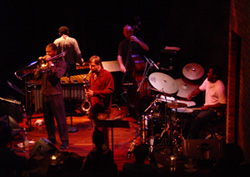| | Dave Holland Quintet
Minneapolis MN, 18 October 2004
by Scott Hreha
December 2004
 The Dave Holland Quintet is, by now, one of those institutions whose reputation travels well ahead of its physical presence. After winning innumerable awards for its compositional and instrumental prowess, the group rides so high on the magic carpet of mainstream critical acclaim that it’s tempting to simply accept it on the basis of its accomplishments rather than the experience of a real-time setting. So it’s with this in mind that I ventured to the Dakota Jazz Club & Restaurant’s still somewhat-new home in downtown Minneapolis to see the phenomenon in action for the first time. The Dave Holland Quintet is, by now, one of those institutions whose reputation travels well ahead of its physical presence. After winning innumerable awards for its compositional and instrumental prowess, the group rides so high on the magic carpet of mainstream critical acclaim that it’s tempting to simply accept it on the basis of its accomplishments rather than the experience of a real-time setting. So it’s with this in mind that I ventured to the Dakota Jazz Club & Restaurant’s still somewhat-new home in downtown Minneapolis to see the phenomenon in action for the first time.
While I wouldn’t go so far as to call the Quintet’s recordings bland, there is a certain sense of predictability that has come to define a studio effort by the band: Meticulously composed pieces with varying degrees of fire (depending on the author), shifting rhythmic subtexts, and inspired, if slightly subdued, soloing from all five members. Live, however, the group did indeed transcend the pleasantries of its recorded work with a performance that, although short, magnified its strengths with the precision of a high-end telescope.
On disc, the group revels in the inside, yet exploratory vibe that first came to fruition on 1960s Blue Note records by Bobby Hutcherson, Andrew Hill, Jackie McLean, Grachan Moncur, et al; their live performance (the second set on the first of two nights at the Dakota) proved no exception, starting off with a new, unrecorded Holland composition called “The Eyes Have It”, which featured vibraphonist Steve Nelson studiously choosing his chordal accompaniment with Hutchersonian attention to space. But one thing that became immediately apparent, even on this opening piece, was the chemistry between saxophonist Chris Potter and trombonist Robin Eubanks—while it’s emphasized on the group’s studio recordings, their polyphonic interactions, both in written lines and simultaneous soloing, are truly something to behold in a live setting.
“Not for Nothin’”—the title track from the band’s 2001 CD—followed, allowing new drummer Nate Smith (a recent replacement for longtime Quintet member Billy Kilson) to show off his mastery of the group’s hallmark transitions from stilted groove to driving uptempo swing. A Robin Eubanks composition, “Full Circle”, came next, shifting gears until it settled into a gangly funk with Holland and Smith totally locked in to propel Potter’s tenor solo. Eubanks found an even deeper inroad to the part-Miles, part-JB’s mood served up by the rhythm section, taking a solo that embodied the perfect combination of J.J. Johnson and Fred Wesley.
The only moment that skewed toward the lackluster was the group’s nearly verbatim reading of “Make Believe”, a stately ballad that originally appeared on the band’s Prime Directive disc. While the combined force of Nelson and Smith’s mallets provided a mellow contrast to the band’s uptempo pieces, the overall effect was one of relief that Holland’s commencing joke about playing a whole set of ballads—due to drowsiness following the band’s intermission meal—was good humor and nothing more.
“Free For All” closed the set with a return to energetic Potter/Eubanks dialoging, after Holland’s unaccompanied introduction put his nimble pizzicato technique in the spotlight. The piece also featured Smith’s only extended solo of the evening (or the second set, at least), which, despite its bombast, thrilled the crowd. Even in the face of the audience’s enthusiasm, Holland begged off an encore, pleading fatigue after extensive travel and a lengthy first set. Inequity aside, it was hard to hold too strong a grudge after a solid performance from one of jazz’s most consistent and professional working units.
| | | | |

